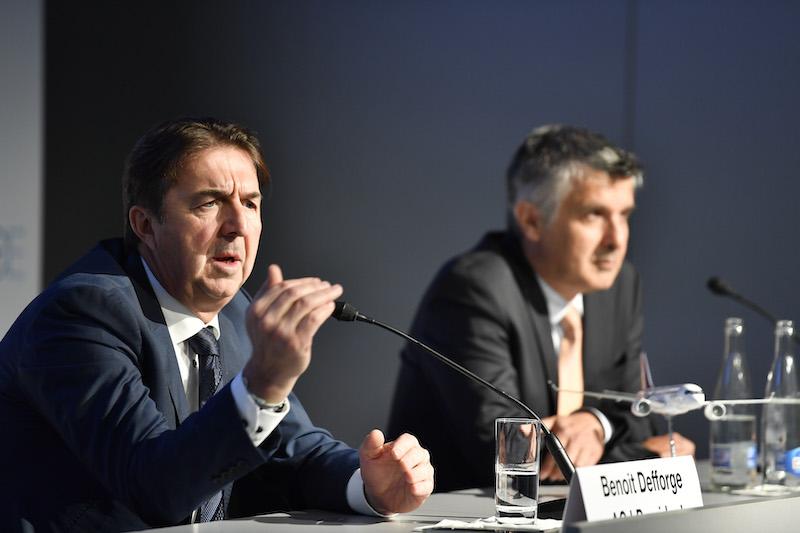
Airbus Corporate Jets head Benoit Defforge addresses the press at EBACE on May 22.
GENEVA—Ahead of last year's EBACE, Airbus Corporate Jets' president Benoit Defforge confidently predicted his division would be able to sell 10 of its new ACJ TwoTwenty aircraft per year.
Twelve months on—and with the first of the new type appearing in the static display following its entry into service with the launch customer, hotel group FIVE—Defforge and ACJ's commercial vice president, Chadi Saade, are even more bullish. The TwoTwenty opens up an addressable market six times bigger than the rest of the ACJ range can target, they said, and both men believe that orders for multiple TwoTwentys from fractional operators will arrive in due course.
"It's in the sweet spot between price, range and comfort," Defforge told a press conference here May 22. The ACJ TwoTwenty can fly over 99% of the missions flown by long-range business jets, he said, citing company analysis of Flightradar data, but costs less to buy and to operate, while offering a far larger cabin.
"Just think about it: if you could get a four-bedroom apartment for the same price as a two-bedroom apartment in the same building—why would you go for the two-bedroom apartment?" Saade asked. "The value proposition is completely unique."
Part of how Airbus keeps the price down is by offering modular cabin configuration options—this is one reason, Saade said, that ACJ is confident that high sales for the TwoTwenty will not come at the expense of the ACJ319neo, where customization options are unlimited. Another reason is that the company has already booked an ACJ319neo sale in the first quarter of 2023.
The value proposition is also one ACJ believes will prove irresistible to fractional fleet operators—though it may be a little while before anyone from that part of the market places an order. The combination of lower operating and acquisition costs with an expected higher residual value would enable operators to offer an enhanced cabin experience as a free upgrade to customers, and still increase margins, Saade argued.
"If you look from that point of view, and you're the CEO of a fractional-ownership company, you say: 'Yes, one day or another I'll have to offer that to my customers,'" Defforge said. "I understand that in their position I would say, 'Benoit, continue entry into service, then we'll see.' Now we have the aircraft, I'm sure we'll have some of those key players on board."
The company has made the first sale of an ACJ330neo, Saade announced during the press conference. The order is one of three the division recorded in the first quarter of 2023, though the identity and region of the customer have not been disclosed. The aircraft will be the -800 variant.
The ACJ330neo has fuel efficiency 12% better than the conventional engine model, giving a flight time of over 22 hr., meaning that "from Geneva you can fly non-stop to the world," Saade said. Further sales are expected soon.
"Today there are 40-plus ACJ330/340s in service, but 26 are over 15 years old, and 16 are over 20 years old," Saade said. "When you consider the time you need to get an aircraft in service, now is the right time to start thinking about replacing those older aircraft."
